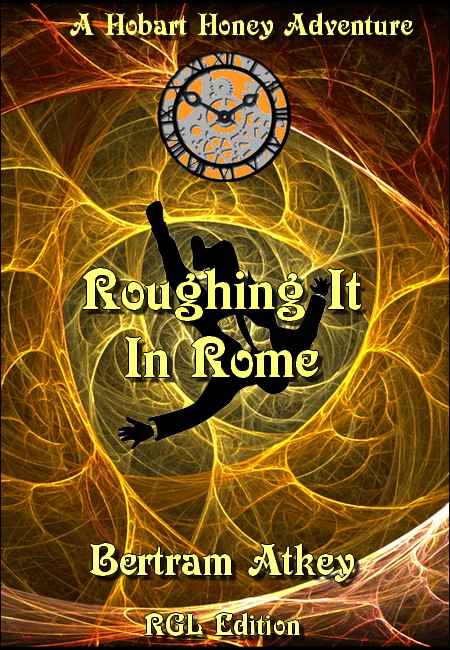
RGL e-Book Cover©
Roy Glashan's Library
Non sibi sed omnibus
Go to Home Page
This work is out of copyright in countries with a copyright
period of 70 years or less, after the year of the author's death.
If it is under copyright in your country of residence,
do not download or redistribute this file.
Original content added by RGL (e.g., introductions, notes,
RGL covers) is proprietary and protected by copyright.

RGL e-Book Cover©

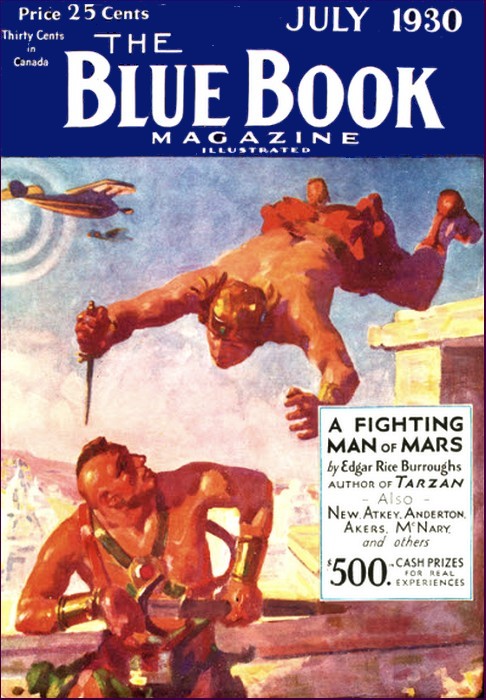
The Blue Book Magazine, July 1930,
with "Roughing It In Rome"
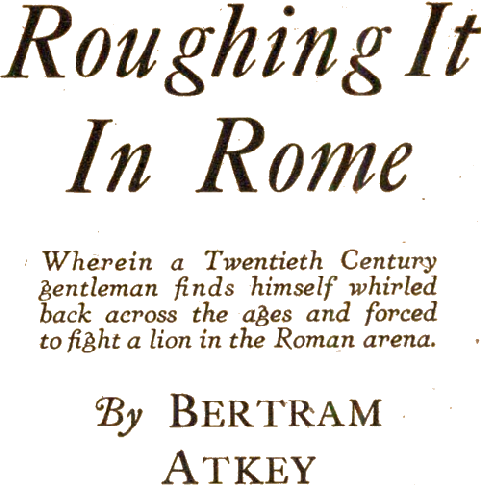
WHILE traveling in India it so happened that Mr. Hobart Honey saved the life of an important Tibetan lama; and in return the lama presented Mr. Honey with a bottle of marvelous pills, any one of which possessed the singular power of temporarily reinstating the swallower of any one of them in one of his previous existences.
Mr. Honey—unmarried, middle-aged—had taken some months to screw himself up to the point of an experimentr. Nothing but an insatiable curiosity and a very good opinion of himself would have driven him to it. If he could swallow a pill and be certain of finding himself back in the days when he was, possibly, King Solomon, Julius Caesar, Richard the First, or some such notable man, that would be quite satisfactory. But there seemed to be a certain risk that he might select a pill which would land him back on some prehistoric prairie in the form of a two-toed jackass, or on the keel of an ancient galley in the form of a barnacle, or something wet and uncomfortable of that kind.
It was undoubtedly a risk. He might find himself the Great Mogul or T'Chaka—Jonah, Shakespeare, Jack Sheppard, Adam, Oliver Cromwell, a dromedary, a polecat, a starving wolf, a skunk, or merely a house-fly in a spider's web.
And a risk it proved; for his first venture took him back to that difficult time when he was court chiropodist to Queen Semiramis. Mr. Honey didn't enjoy being court chiropodist; nor did he, indeed, especially enjoy his experiences as a cave-man and as a pirate which, in due succession, followed. But although his singular experiences with the first three pills had quite undeniably worn off the fine edge of his enthusiasm for exploring the nooks and crannies of time, Mr. Honey had by no means abandoned the hope of re-enjoying for a brief period an existence which, if not glorious, should prove to be creditable.
"At the rate I am going on," he said rather bitterly to Peter his cat, as he settled down in his big baggy chair on the evening he proposed to venture upon his fourth pill, "at the rate I am going on, it will not be long before I shall lose any self-respect I have ever had. I appear to have been—at any rate, in three separate existences—a person entirely without morals, manners, or scruples of any description. My distinguishing characteristic seems to have been avarice. I appear to have been totally without ability, even the ability to keep the plunder which I have managed dubiously to acquire. And—to be quite frank—I have not been overburdened with intelligence.
"We must do better—yes, very much better," he added; and carefully selected a pill. He surveyed it thoughtfully as it lay in the palm of his hand. "It would be pleasant to awake and find oneself a king," he mused, less hopefully than on previous similar occasions. "But I fear greatly that the chance is remote. There have, of course, been many kings—
Since man first appeared,
A boy without beard,
And scarcely a rag to his back,
as one of our minor poets has so feelingly observed; I realize, of course, that there have also been many people. But I really think I am entitled to expect an—er—position worth having before I have swallowed many more of these pills."
He poured out a glass of sherry with a little sigh.
"However, one must hope for the best, and put up with what one gets. Now"—he swallowed the pill, and flooded it down with sherry—"let us trust I emerge a general or a chief at the least."
HE leaned back tranquilly. He did not close his eyes, as he wished to see what signs—if any—of his transmigration manifested themselves. According to his custom, he had switched off all the lights except the small heavily shaded desk-light, and the room was very dim. He stared at the wall to the side of the fireplace, thinking rather vaguely that he would soon have to have the room repapered. He was getting tired of the pattern of the wall-paper—a simple striped pattern, straight lines of dark brown running down a background of slightly lighter brown—yes, tired. He decided that he would have another pattern, something lighter, airier, less severe—something with bunches of pink roses all over it. Then abruptly it occurred to him that it was growing very noisy in the street outside—extremely noisy.
Also the room was suffocatingly hot, stuffy, even fetid. And there was something very wrong with the stripes, the bars, upon the wall-paper. They seemed to have blackened, become heavier and more massive.
Mr. Honey, with a sinking heart, stared at the bars—he was sure they were bars—iron bars. It was a grating in an archway. Beyond the archway was light, bright and dazzling, and a din—a shouting and clashing of swords. And there was a peculiar and terrible smell in the air, the odor—was it?—of blood.
Mr. Honey leaped to his feet, uttering a sound that would have been an exclamation in the Twentieth Century, but was now a huge and hollow-chested roar. He ran swiftly across to the grating, gripped a bar in each hand, and shook it with all his strength. Some one from outside thrust the butt of a spear through the bars into his face, and he drew back.
He stared about him.
He found himself alone in a small arched vault, incredibly hot, extremely dirty. The floor was strewn with the skins and remains of various fruits and vegetables.
"This is positively unspeakable," said Mr. Honey, really angry; and he began to beat upon his chest with huge clenched fists, an unreasonable proceeding which, nevertheless, seemed very natural.
Then Mr. Honey caught sight of his feet. They were like large and unshapely hands. All his toes looked like splay fingers. Also he was hairy beyond all reason. A fearful doubt assailed the mind of the unfortunate seeker after knowledge. Who—or what—was he? He touched his face. It felt odd, and his teeth were enormous. His nose had vanished, but he was amply supplied with nostrils—over-amply, indeed.
Was it possible that he was a gorilla? He began to suspect it. But a moment later, and quite unconsciously, he switched his tail round to the front of him, and, to his astonishment, he perceived that growing upon the end of the tail was another hand. It was, indeed reaching out for a piece of melon that lay close by, which it picked up and politely passed to Mr. Honey.
WHEN his Twentieth Century habits of thought receded, as usual, to an immense distance; and Mr. Honey the author merged definitely into what he now was—namely, a Missing Link, imprisoned in a cell which gave on to the arena in Rome, awaiting his turn to provide entertainment to the populace enjoying the "games."
He realized the position perfectly, as, muttering sullenly, he slouched forward to the grating, through which he peered. He could see very little, as the glare of the sunlight was too dazzling; but that inconvenienced him only slightly, for his scent was so keen that his flat nose was practically another pair of eyes.
Glaring through the grating, he became aware of many scents—all irritating, and some, indeed, positively maddening.
In the vault next-door, for instance, was a lion; and Huna, the Missing Link—captured in, and imported from, Africa, at great expense, for use at the "games"—hated lions bitterly. Farther along, he scented a batch of leopards; and leopards he detested and despised. He could afford to despise them, for he was seven and a half feet tall and a little over four feet and a half broad at the shoulders. His limbs were colossal, and his muscles were like wire hawsers. It should not be imagined that he particularly feared lions, tigers, or any of the hook-footed carnivores; he merely disliked the habits of all flesh-eaters.
But as he snuffed at the grating, he became conscious of a certain anxiety; for there was a smell of elephant in the air—of elephant and rhinoceros, and of African buffalo. These were foes of another caliber—if foes they were. Huna had always been civil enough to them back at home. Never intimate or even friendly, but nodding acquaintances. Huna and his folk had always minded their own business, and the pachyderms and the others had minded theirs. He caught himself half hoping that there would be no trouble with any of them.
He caught a whiff of crocodile, too, and his big teeth were suddenly bared in a terrible and menacing grimace; for crocodiles were his pet aversion. As a youngster, he had nearly lost a foot once to one of these scaly terrors.
Across the shifting, complex, invisible lattice-work of many scents came faintly and elusively one which made him start and stare. Surely that was impossible! Quite impossible! He sniffed again. Yes, it was! Surely, that was the exact flavor of Jimi, his very best pal—old Jimi, one of the finest Missing-Links that ever lived!
Mr. Honey's heart jumped. He had been under the impression that he was the only one of the tribe captured on that fatal occasion when the hunters raided the village—by most evil chance, on the very night that they had all been celebrating his, Huna's, thirtieth birthday. He had not seen any other Missing Link since that night. If they had captured dear old Jimi as well, evidently they had brought him to Rome by another route.
Huna beat his chest. He did not wish Jimi any harm, but, at the same time, it was decidedly bracing to know that there was a chance of fighting shoulder to shoulder with the one Link above all others he would have chosen, had it been left to him. He pressed his face against the grating and sniffed long and keenly. Yes, that was Jimi right enough. Good old Jimi! By the sacred coconut-tree, if only he and Jimi could get hold of a club apiece, they would show these Romans something!
He gurgled quite pleasantly as he thought of it, and a misguided and probably slightly intoxicated keeper in the arena put his finger through the bars and wiggled it playfully at the Missing Link, saying, in Latin:
"Ah, there, old boy. There you are, then!"
Mr. Honey promptly bit the finger off, and the Roman desisted hurriedly from asking foolish questions, and sought the nearest doctor.
The time slowly wore on.
His eyes becoming more accustomed to the dazzling sunlight, Huna saw the vast bulk of the big war-elephant go stamping and swaying about the arena; the rhinoceros, too, appeared and disappeared. Then, the gladiatorial combats and other unspeakable "events" being finished, the big grating of Mr. Honey's vault abruptly shot down its grooves into the ground with a clang that startled the Missing Link.
"Now, where on earth did that gate go to?" he asked himself, feeling the top of it, which protruded an inch or so above its brass-lined slots, puzzled over the thing for a moment or two, then gave it up and slouched sullenly out into the arena, looking for Jimi.
But he had the arena entirely to himself. All signs of the earlier combats had been removed, fresh sand had been sprinkled over the sinister patches which needed it, and all attendants had left the ring.
MR. HUNA, huge, hairy, awesome, stood at his full height, and stretched himself gloriously after the confinement of the vault. Then he gazed round with keen little eyes, deeply sunken under great, overhanging, hairy brows at the crowds of excited people—tier upon tier of them, with thousands upon thousands in each tier—and his rage flamed up anew.
Bellowing in a language that none of them had ever heard before, he told them precisely what he thought of them. He shook his gigantic gnarled fists at them—tail-fist and all—but they merely screamed with maniacally excited laughter.
For the advent of Huna ushered in the great event of the day. Easing the original Latin of the posters into honest English, announcements relating to Mr. Honey's proposed share in that day's games had been, roughly, as follows:
THE WHOLE ENTERTAINMENT WILL CONCLUDE
With
A COMBAT TO THE DEATH
Between
TWO FULLY-GROWN, FOREST-BRED,
UNTAMABLE, HAND-TAILED MISSING LINKS
(Specially Captured in Africa)
UNIQUE! STARTLING! ORIGINAL!
Owing to the scarcity of these interesting
creatures—believed by Pliny to be
extinct—there has been no such
combat in Rome since the days of Domitian.
DON'T MISS THE LINKS!
GENUINE HAND-TAILERS!
Before the Combat the Links
Will Be Lionized and Enraged
By
A SPECIALLY IMPORTED BLACK NUBIAN LION
OF GIGANTIC SIZE AND GREAT FEROCITY
THE MISSING LINKS WILL FIGHT WITH
SLEDGEHAMMERS
(As Used by the Plutos)
BUT Mr. Honey had not seen the posters, and could not have read them if he had.
No living person of the seventy thousand or so packed in the great Colosseum had ever seen a Missing Link before. Indeed, they were universally believed to be extinct. Consequently, in spite of the allurements set out on the posters, the people were exceedingly doubtful as to whether the creatures—for there were two—would put up a "sporting" show.
Huna's outburst went far to remove this doubt. It was abundantly evident that this one, at any rate, was not going to take things lying down.
"Loose the lion on him!" they yelled. "Let's see what he can do! Give him his hammer now. Don't squander a good Missing Link on a lion!" shouted some—for Mr. Honey was to face the lion unarmed.
The furious Missing Link shouted back, at them.
"I don't know what you're talking about, but come down here and I'll give you something to shout for!" he bawled.
Then half a dozen men entered the arena, three of them wearing round, winged steel helmets, red shirts and sandals, which also had small wings attached. These three carried long brass rods, red-hot at the end, and each carried a sort of brazier containing hot coals, for heating the brass rods. These individuals were known as the Mercuries, and their duty was to galvanize the more sluggish of the fighters into quicker action with their brass rods.
The other three were huge, long-bearded men with copper crows on their heads, wearing black, star-spangled togas, and carrying enormous sledgehammers. These were the Plutos, whose usual office it was to drag the victims of the combats from the arena, and to put out of their misery those who still breathed after the fights were over. It will be seen that the gentle ancient Roman was a tidy person, and not without foresight.
Mr. Honey, glancing at the new arrivals, decided to destroy the Plutos first—he felt he would like those three hammers—but just as he started for them, another grating shot down with a clang, and a magnificent Nubian lion leaped from his vault into the arena with a deafening roar. As he bounded out, two of the Mercuries, standing one on each side of the vault mouth, touched him with the tips of their rods. He gave a really extraordinary bound, and headed straight for Mr. Honey, whom he appeared to think was responsible for the sudden stabs of pain.
THE Missing Link set his teeth and prepared for business.
"All right—if you must, you must!" he muttered.
The lion rose in the air, leaping straight for Huna's throat. But with extraordinary swiftness the Missing Link swerved aside; and as the ferocious brute passed him, he seized it by the tail with his left hand and his tail-hand, giving at the same time a peculiar side twist, and bracing himself against the strain. There was a jar, and the lion landed on his side, snarling. Instantly Huna, allowing his right hand to take the grip of his tail-hand, began swiftly to slither round in a circle, pulling hard at the tail of the Nubian man-eater all the time.
Almost at once the big bulk of the lion was lifted into the air, swinging round and round faster and faster as Huna revolved faster. The man-eater was making singular noises, but the Missing Link ignored them. He was gazing coolly round the packed tiers looking for a target.
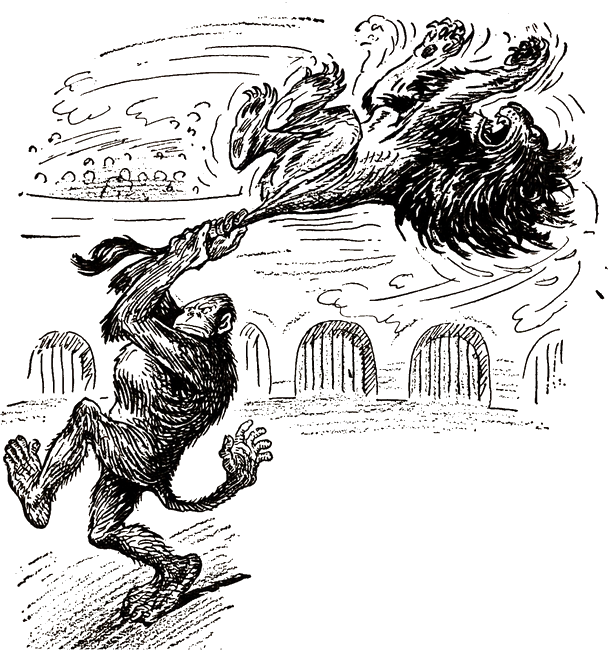
The big bulk of the lion swung faster and faster as Huna
revolved. The Missing Link was looking for a target.
A patch of special splendor caught his eye—a roomy, shaded place, where sat an arrogant-looking man, whom swarthy slaves fanned unceasingly, surrounded by gorgeously bejeweled and appareled people. As a matter of fact, this was the Emperor, but Huna neither knew this, nor cared. He was too busy taking careful aim at him to wonder who or what he was. He put on speed until he was accomplishing an incredible number of revolutions per minute, and then suddenly released the now completely giddy lion.
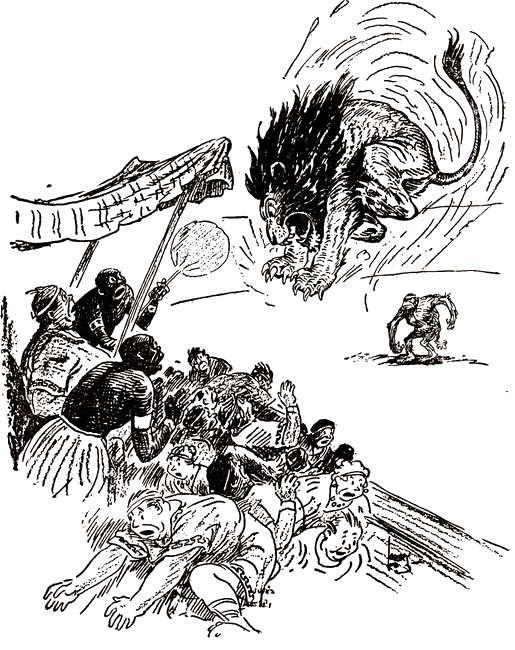
Straight as an arrow the big man-eater
flew through the air at the Emperor.
STRAIGHT as an arrow the big man-eater flew through the air at the Emperor. But Huna's long sojourn in the vault had affected his judgment a little; and the lion, clawing furiously in every direction at once, fell short of the Emperor and landed upon a little group of three men seated just below the throne. In an instant two of these were extinct, and the third ruined for life. The lion, however, was too giddy really to know what it was doing, and a moment later was dispatched by the bodyguard of soldiers round the Emperor. It was all over in less than two minutes, and amid a literally deafening uproar, the Missing Link sat down to take breath.
"Perhaps that'll learn 'em to set lions on to me!" he said, panting; and watched the uproar in the royal box.
The defunct lion was cast back into the arena, and Caesar rose to show that he was uninjured, and to receive the acclamations of the multitude.
The three unfortunates sacrificed by the lion were carefully removed by their slaves, and the clamor of the delighted crowds gradually died down as they awaited the orders of Caesar.
Caesar, for his part, was making a few inquiries, and receiving some good news—to wit, one of the two nobles destroyed by the lion was none other than the Lord Cusscarrara Superbus, a nephew of Caesar. But he was a nephew whom Caesar strongly suspected of being the head and moving spirit of a conspiracy which, his detectives said, would shortly be started with the object of rendering vacant Caesar's throne—subsequently to be reoccupied by Cusscarrara Superbus.
Consequently, in the blunt, downright Roman way, Caesar was unfeignedly glad to see the finish of Cusscarrara, and did not hesitate to say so to his wife and one or two friends close by. He gave an order to a courtier, who passed it to the heralds.
IT was announced a moment later that the Emperor, ever an admirer of bravery, had decided that the fight between the Missing Links would now take place as per announcement (loud cheers) but that in the event of the victory of the Link now occupying the arena, his life would be spared, and instead of being called upon to fight the rhinoceros, he would be tamed, if possible, have the freedom of the city bestowed upon him, and be appointed chief gladiator to the Emperor. The long and sustained cheering of the populace showed them to be in complete agreement with the orders, and Caesar proceeded to give the sign.
The Mercuries speedily left the ring; the Plutos, throwing their hammers across to Huna, followed their example without delay.
While Mr. Honey was collecting the hammers another grating shot down. For a time nothing emerged from the gloomy vault now opened to the arena.
Mr. Honey, armed with the entire set of hammers—one in each hand and one in his tail-hand—his blood now thoroughly up, pranced about the arena, his eyes fixed on the vault, uttering blood-curdling threats.
Suddenly the occupant of the vault slouched forward, gnawing unconcernedly at a huge vegetable-marrow. It stepped into the arena, blinking a little in the blinding sunlight—a mighty Link, bigger and uglier even than Mr. Honey. It had a good-natured face, however, and in its eyes was a gleam of humor that was missing from Huna's.
It was Jimi—good old Jimi!
Mr. Honey stopped flourishing his hammers.
"Hey, Jimi! Hallo, Jimi!" he shouted gayly. "How are you, old man? How goes it? What are you doing here? Give us a bit of marrow! Have a hammer, old chap—might need it."
Mr. Honey passed his friend a hammer, and they shook hands—tail-hands, as was the custom among the Missing Links of those days—warmly.
Jimi glanced round at the breathless multitude watching them.
"It looks to me, old man, as if we're rather in the cart, hey?" he remarked. "There's an awful lot of people here." Huna nodded.
"Still, we've got some goodish hammers, if it comes to the worst. Sit down, old man, and tell us how you got here. This comes of drinking too much palm-wine on birthdays, Jimi."
Jimi grinned. "Oh, well, what's the odds as long as you're happy!" he said.
They sat down amicably side by side, eating marrow, their hammers temporarily laid aside.
"They aint going to scrap at all, them Links aint!" yelled a disappointed voice from the gallery, or top tier, of the amphitheater. "Why, they're pals, mates; that's what they are. Where's the blooming Mercuries? Let 'em touch 'em up a bit and enrage 'em."
Caesar, who had taken quite a liking to Huna, sprang to his feet.
"Off with that man's caput!" he said. "Behead me him! No, stay! Since he is so eager for sport, let him be brought to the arena and provide it! Match him against the bear from Dacia."
THEY knew how to deal with rebels in those days, and hardly had Caesar given his order before the lad from the gallery—a tough-looking, unshaven ruffian in a ragged toga—was hustled by the soldiers down to the entrance to the arena.
But Caesar had had another idea. It had occurred to him that it would be useless to spare the Missing Links unless they were tamable. He ordered, therefore, that dainty food should be laid before the Links as a preliminary, and that the protester should do the laying before.
The order went forth, with a musical accompaniment by the heralds. It pleased the audience, rendered good-humored by the sight of much bloodshed and the expectation of more, and within a few moments the gallery boy, bearing a tray of magnificent fruit with goblets of wine, and protesting violently, was being "touched up" by the Mercuries with a view to urging him on.
"Get on, fool!" hissed one of them. "If you make a success of it, Caesar might appoint you valet to one of the hand-tailers. It might be the making of you! And, anyway, you can but die once."
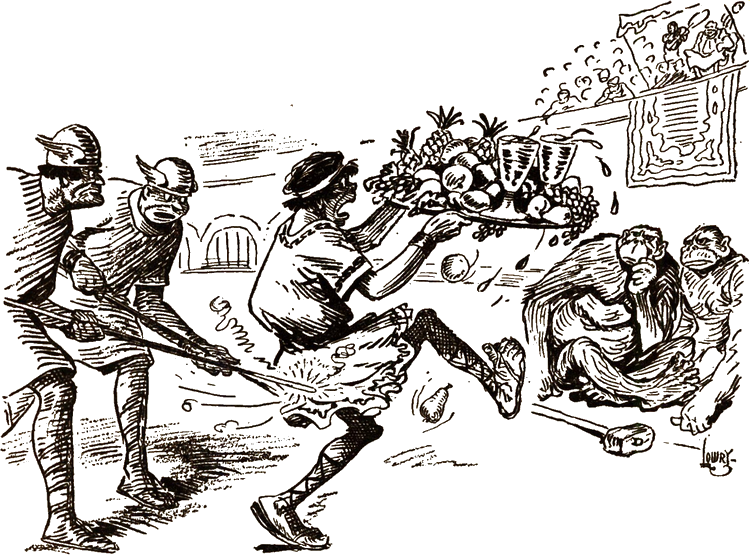
"Get on, fool!" hissed one of them. "If you make a success of
it, Caesar might appoint you valet to one of the hand-tailers.
Making the best of an extremely bad job, the doomed wretch advanced upon the two Missing Links, who, seated in the sand of the arena, were chatting over their adventures, totally ignoring the noisy crowd.
Mr. Honey broke off as the shivering bearer of fruit drew near.
"What's the idea, d'you think, Jimi?" he asked.
Jimi fixed his twinkling eyes upon the goblets.
"Why, it looks to me as if it has struck somebody among this bald-faced rabble that it's time for a drink, and I agree."
"Me too," quoth Huna.
They surveyed the man so godd-humoredly as he drew nearer that he plucked up courage, and as neither of them made a move to seize their hammers, he came on quite jauntily. He dropped on one knee, and proffered the tray with a rather nervous wink.
"'Ave a drink, mates?" he said hoarsely. "I never meant no offense when I hollered out."
They did not understand his Latin, but they did his gesture.
Mr. Honey took a large crystal goblet—passed it to Jimi. Then he took one himself.
They held the goblets up to the light.
"This is better-class stuff than homemade palm wine, my boy, unless I'm very much mistaken," said Jimi. "Well, good health!"
"Here's luck!" said Mr. Honey.
They replaced the empty goblets.
"Now, that's wine, that is," they said simultaneously.
Then they took a pineapple, a bunch of grapes, and a melon, and Mr. Honey, staring at the "waiter," peremptorily rang his fingernail against the side of the empty goblet. The man who does not understand that signal has yet to be born, and the waiter hurriedly left to get the goblets refilled.
"I fancy they mean to make a fuss of us, after all," said Jimi, surveying the crowd.
Mr. Honey agreed. "I'm willing," he said. "If they treat us right, we'll treat them right. That's fair enough, aint it?"
"Sure," said Jimi. "But I wonder why?"
"So do I. Still, never mind Here's how!"
"Happy days!" replied Jimi.
WHETHER it was after his fifth goblet, or his eighth, that things began to get confused and whirly, Mr. Honey never really knew. He fancied that, after a while a lot of aristocratic people came into the arena, and were very friendly, but somehow things went all foggy. He thinks he must have gone to sleep. At any rate, he woke suddenly to hear himself saying gravely: "Well, chin-chin, Jimi!" to Peter his cat, who, sitting on the hearthrug in the study, was regarding him with every symptom of grave disapproval.
Mr. Honey pulled himself together. Evidently the fourth pill had been another awful failure. What a horrible "past" he seemed to have had!
He stared into the fire for a long time.
"A Missing Link!" he said presently, with extraordinary bitterness. "A hand-tailed Missing Link, carousing in the Colosseum at Rome, with a kindred spirit. Bah! Disgraceful!"
Then he rose abruptly, put on his hat and coat, and went for a sharp walk. What else was there to do?
One nightmare per night was enough for Mr. Honey—enough and to spare.
Roy Glashan's Library
Non sibi sed omnibus
Go to Home Page
This work is out of copyright in countries with a copyright
period of 70 years or less, after the year of the author's death.
If it is under copyright in your country of residence,
do not download or redistribute this file.
Original content added by RGL (e.g., introductions, notes,
RGL covers) is proprietary and protected by copyright.